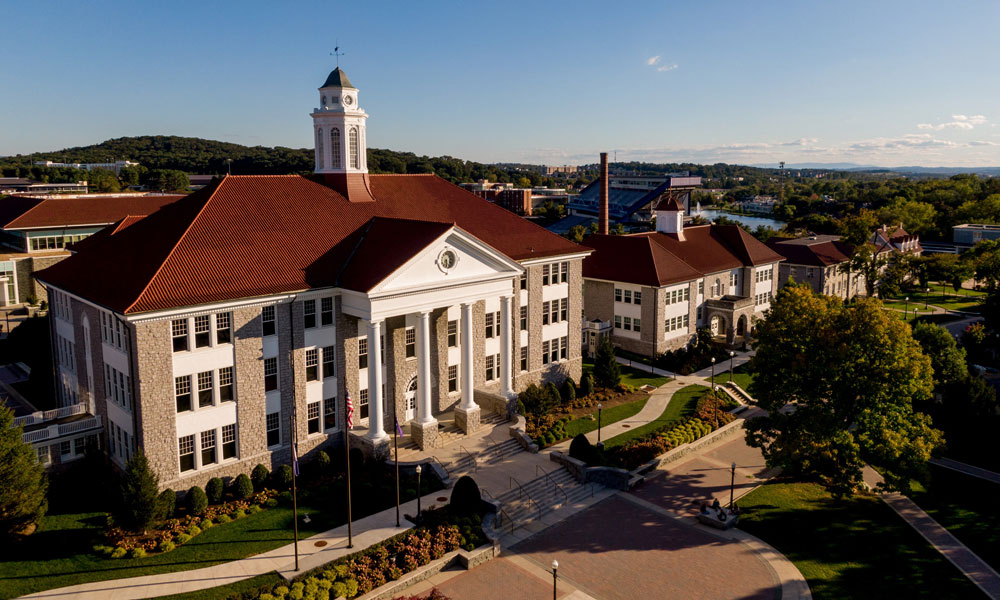Communication that Saves Lives
Office of the Provost

Dr. Heather Carmack (above, second from the right) with other attendees at DCHC 2015
Dr. Heather Carmack is an Assistant Professor in the School of Communication Studies and the coordinator of the Health Communication concentration, where she primarily teaches undergraduate and graduate courses in health communication and research methods. Her research investigates how organizational policies and practices impact public understandings and communication about health. Her work has appeared in leading communication, public health, education, and interdisciplinary health journals, including Health Communication, Qualitative Health Research, Journal of Communication in Healthcare, Western Journal of Communication, Sexuality & Culture, and Journal of Medical Humanities. Dr. Carmack’s most current projects, published in Health Communication and Qualitative Health Research, examine formal and informal messages about medical errors communicated to nursing students during clinicals.
Dr. Carmack’s research primarily focuses on the ways hospital policies and processes impact communication about patient safety. She is one of two communication scholars in the country who actively study communication and medical errors. As the eighth leading cause of death in the United States, medical errors are often referred to as a “silent epidemic” because of the lack of communication between providers, facilities, and patients. Her work examines the ways providers and health care organizations communicate with internal and external stakeholders about medical errors, specifically exploring how providers, administrators, and the general public make sense of disclosure and apology programs. Although patients and families often wish for more open communication and apologies for medical errors, often hospital policy prevents these communication acts. She is currently working on patient safety projects examining the impact of organizational identification on the acceptance of mandatory vaccination policies and a larger monograph detailing the current state of communication research on medical errors.

Dr. Carmack also studies the communication practices related to health organizing, specifically communication issues related to mobile health clinics. Mobile health clinics are typically mobile clinics located in 40 foot vans which bring health care to underserved populations who do not have ready access to a health care clinic. She is currently working with The Family Van, a mobile health clinic run by Harvard Medical School. As part of an interdisciplinary team of researchers, doctors, and administrators, Dr. Carmack is examining the ways patients’ communication about The Family Van generate a narrative of generosity. She previously studied the different privacy issues which arise because of the unique nature of mobile health clinics. Her research on mobile health clinics was recently cited in Slate magazine.
Recently, Dr. Carmack completed work examining college students’ beliefs, attitudes, and intentions to use e-cigarettes. As part of an interdisciplinary research team, she and several faculty from the Department of Health Sciences received a $42,000 grant from the Center for the Study of Tobacco Products to examine the impact of risk messaging on students’ beliefs and intentions. The research team has been presenting findings from this project at the DC Health Communication Conference, where they received the Outstanding Research Presentation Award.
A dedicated scholar-teacher, Dr. Carmack works with undergraduate and graduate students on a number of health communication projects, including students as co-authors where they learn not only the research process, but also the work behind writing, presenting, and publishing research. She has published over 40 articles and book chapters. Her first book examining toxic workplace communication was published by Kendall Hunt in 2014. She has received several awards for her research, including the 2013 American Forensic Association Daniel A. Rohrer Award for Outstanding Research and the National Communication Association Communication as Social Construction Division’s 2015 Article of the Year Award.
Dr. Carmack received her B.A. in Communication from Truman State University (Missouri), her M.A. in Communication from Ohio University, and her PhD in Health Communication from Ohio University. Before coming to JMU, Dr. Carmack was an Assistant Professor and Director of Graduate Studies (MA in Communication) at Missouri State University. She taught courses in general communication, health communication, organizational communication, and research methods at Ohio University and Missouri State University. She is active in the National Communication Association, currently serving as the Chair of the Applied Communication Division. She also served as a board member and research mentor for the Center for the Research on Speech and Debate, a consortium of high school and collegiate speech and debate educators dedicated to encouraging empirical research in forensics.
